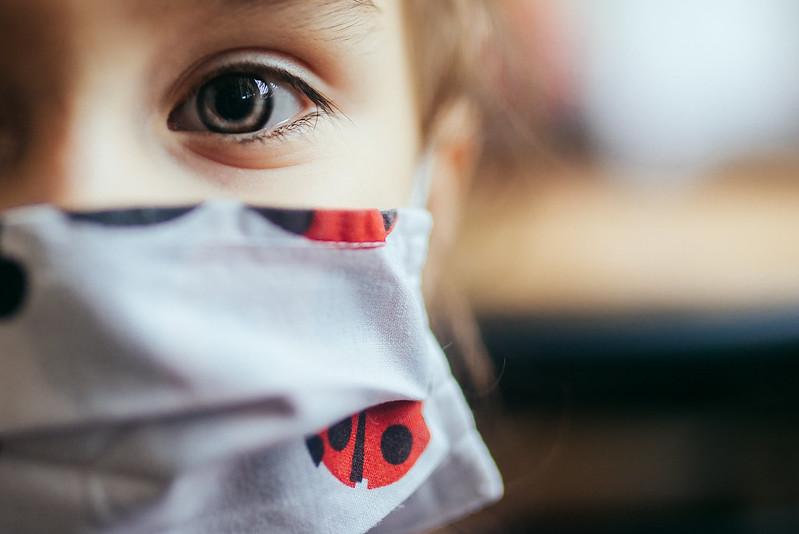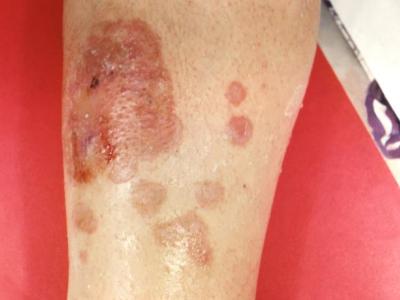Two new US studies describe pediatric COVID-19, one finding that 7.0% of hospitalized children developed neurologic complications such as seizures, and the other showing that even mild infections can lead to long COVID.
7% have seizures, brain damage
In a large, multicenter study published today in Pediatrics, a team led by Vanderbilt University researchers followed 15,137 COVID-19 patients aged 2 months to 17 years released from 52 US children's hospitals participating in the Pediatric Health Information System database from March 2020 to March 2022.
Of the 15,137 patients, 82.1% had a primary COVID-19 diagnosis, and 17.9% had a secondary diagnosis of COVID-19 and a related complication. A total of 37.1% of children had a complex chronic condition (CCC), and 9.8% had at least one previously diagnosed neurologic CCC.
Seven percent of patients developed a neurologic complication, the most common of which were fever-triggered seizures (3.9%), non–fever-related seizures (2.3%), and encephalopathy (brain damage or disease) (2.2%).
Children with neurologic conditions had longer hospital stays, higher hospital costs, more intensive care unit (ICU) admissions (29.8% vs 21.8%), longer ICU stays (3.2 vs 2.5 days), more hospital readmissions, and higher rates of in-hospital death (1.8% vs 0.6%) than those without these conditions.
Factors tied to a lower likelihood of neurologic complications included younger age (adjusted odds ratio [aOR], 0.97), infection during the Delta variant surge (aOR, 0.71), and presence of a nonneurologic CCC (aOR, 0.80). Lower odds of a neurologic complication were also associated with COVID-19 treatment with the antiviral drug remdesivir and/or dexamethasone, a corticosteroid. Neurologic CCCs were linked to greater odds of a neurologic complication (aOR, 4.14).
The reasons for the association of a lower likelihood of neurologic complications and a Delta infection are unclear, although the link may be due to the greater proportion of children who had been either infected with the virus or immunized by that time than during the period dominated by the wild-type virus, the researchers said.
"If true, we would expect subsequent variants to also have lower odds of neurologic complications compared to wildtype SARS-CoV-2," they wrote, adding that they found no evidence of a link between the Omicron variant and neurologic complications. "However, the power to detect differences may have been limited by the relatively short portion of the study in which Omicron was the dominant circulating strain."
The findings show that neurologic complications are common in children hospitalized with COVID-19 and are tied to worse hospital outcomes, the authors said. "Our findings emphasize the importance of COVID-19 immunization in children, especially in high-risk populations, such as those with neurologic co-morbidity," they wrote.
They called for further study of the association of remdesivir and dexamethasone treatment with lower odds of neurologic complications. "It is biologically possible that reduced viral replication and decreased inflammation could reduce the risk of neurologic complications," they wrote.
Symptoms lasting more than 12 weeks
In the second study, published yesterday in the Pediatric Infectious Disease Journal, a team led by University of Texas at Houston researchers analyzed data from the ongoing Texas Coronavirus Antibody Response Survey (CARES) of Texans aged 5 to 90 years from October 2020 to May 2022. Through CARES, participants are offered as many as three SARS-CoV-2 antibody tests at a participating laboratory of their choice over 6 months.
Adults and parent proxies also completed a brief online questionnaire on demographic information and medical history. Of all participants, 23.3% reported one or more underlying medical conditions before the Delta wave, compared with 17.8% amid Delta and beyond.
Of 1,813 nonhospitalized COVID-19 patients, 4.5% reported at least one lingering symptom, 8.0% of whom were infected before Delta, and 3.4% of whom were infected during Delta or later. Of all participants with persistent symptoms, 1.5% were 4 to 12 weeks post-infection, and 3.3% were 12 weeks out or more. All participants with long-COVID symptoms had symptomatic acute infections, with the vast majority describing them as mild.
Three participants without detectable SARS-CoV-2 antibodies (seronegative) reported long-COVID symptoms. Of the 27 seropositive children and teens who reported symptoms 4 to 12 weeks after infection, 46.2% were aged 10 to 14 years, and 46.2% were 15 to 19. Of the 58 seropositive children and teens who reported symptoms lasting longer than 12 weeks, 21.4% were aged 10 to 14 years, and 69.6% were 15 to 19. The vast majority of participants who reported long-COVID symptoms and were seropositive were unvaccinated.
Children of all age-groups were at lower risk for long-COVID symptoms than adults, regardless of how long they had had symptoms (ages 5 to 19, 93% lower risk; 10 to 14, -78%; 15 to 19, -77%). Risk factors for persistent COVID-19 symptoms at 12 weeks or longer included severe infection, being unvaccinated, and having a body mass index (BMI) at the 85th percentile or higher for age and sex (overweight or obese).
The most common symptoms among seropositive participants at 4 to 12 weeks were loss of taste and smell (6.7%), fatigue (60.0%), fever or chills (46.7%), and headache (40.0%). Among seropositive participants reporting symptoms for more than 12 weeks, the most common symptoms were headache and fatigue (53.8% each), congestion or runny nose (41.0%), cough (35.9%), and fever or chills (30.8%).
Roughly 30% of seropositive participants with symptoms lasting 4 to 12 weeks said that their social and/or mental health was either mild or moderately affected by their condition (25.0%) or severely affected (5.0%). About one-third (33.3%) of those reporting symptoms beyond 12 weeks and 35.2% who said they had no lasting symptoms (35.2%) experienced mild or moderate social and/or mental health effects, while less than 5% said they were severely affected.
In a University of Texas press release, lead author Sarah Messiah, PhD, MPH, said that participants infected with COVID-19 before Delta were at higher risk for long COVID. "With Delta and Omicron, we did see a lot of children who ended up hospitalized, but their symptoms were less severe, and our results show they were also less likely to report persistent symptoms too," she said.
While it may seem like patients would have to have been severely ill to have lingering COVID-19 symptoms, she said the study findings suggest otherwise. "I encourage parents to still take caution and get their child vaccinated against COVID-19, because we now know that it will decrease the risk of infection and long COVID,” Messiah said.





















